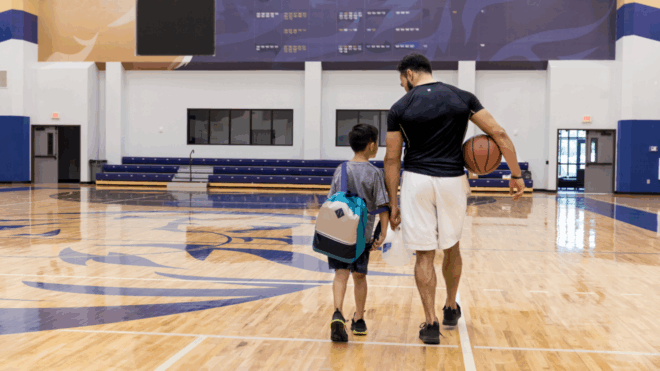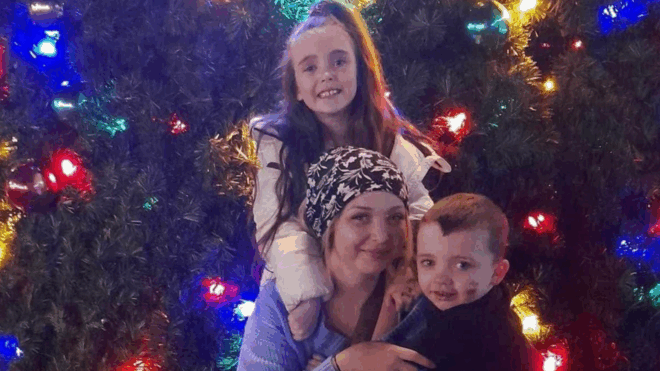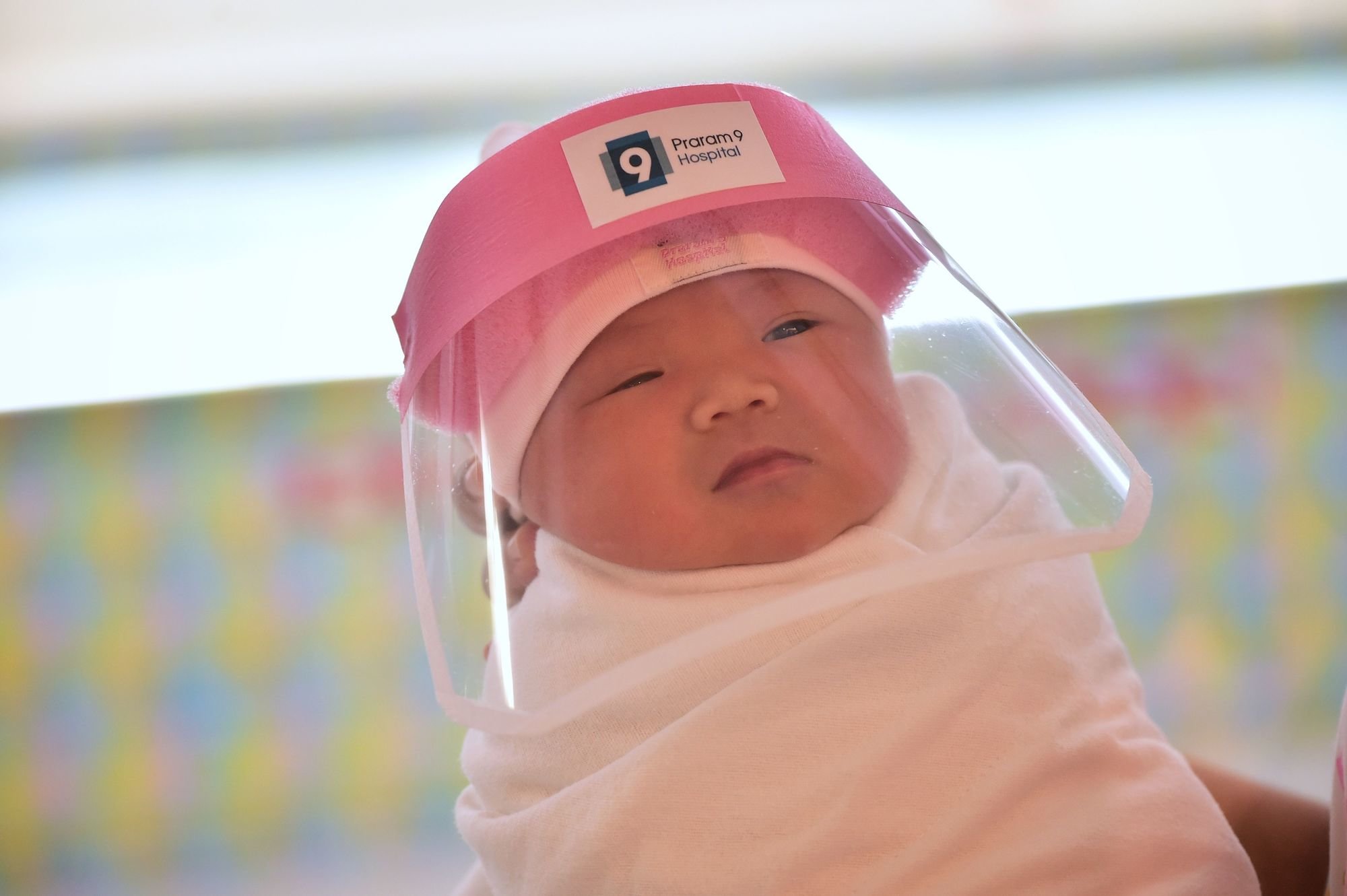
As health care workers across the globe are struggling to stay ahead of the coronavirus, hospital systems are implementing new guidelines to hopefully contain its spread. In most cases, that means canceling all nonessential surgeries and banning visitors. In many maternity wards, it means mandatory quarantines for babies born to mothers who test positive for the virus. But hospitals in Bangkok, Thailand, have apparently taken containment measures one step further by fashioning tiny face shields for newborns to wear in the nursery to protect them from potentially breathing in the virus.
Photos taken from the nursery ward at Praram 9 hospital have been sweeping the internet this week.
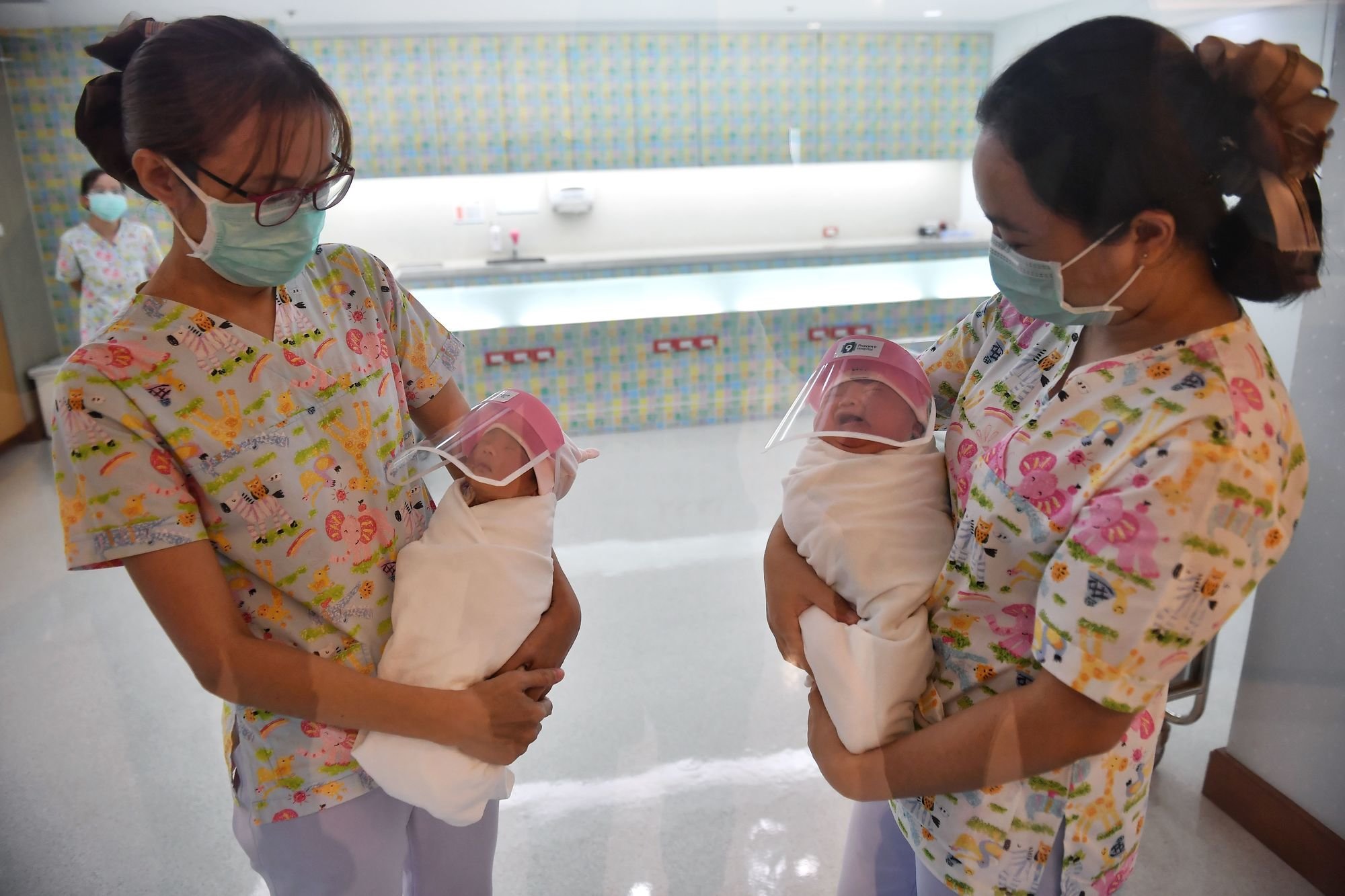
In each one, a swaddled infant is held up by a nurse while wearing a plastic protective visor. The images were taken through a glass window of the maternity ward, as the babies remain isolated inside.
It's a scene that many of us might have found bizarre just a month or two ago. But now, given the myriad of ways everyday life has changed since the pandemic first hit, you might look at the photos and think: Hey, that's practical.
Paolo Hospital in Samutprakarn, Thailand, also seems to have adopted the practice.
“We have extra protection measures for little ones and friends, with face shield for newborns. So cute!” the hospital recently wrote on its Facebook page, according to the Independent.
In truth, the tiny baby visors are cute — but also sad, when you consider the circumstances.
The measure was put in place to protect the newborns as much as it is the medical staff, who increasingly find themselves at risk of exposure to the virus merely by entering the hospital. Whether other countries and hospital systems may follow suit remains to be seen.
Thailand currently has more than 2,400 confirmed cases of COVID-19, with 33 deaths reported so far.
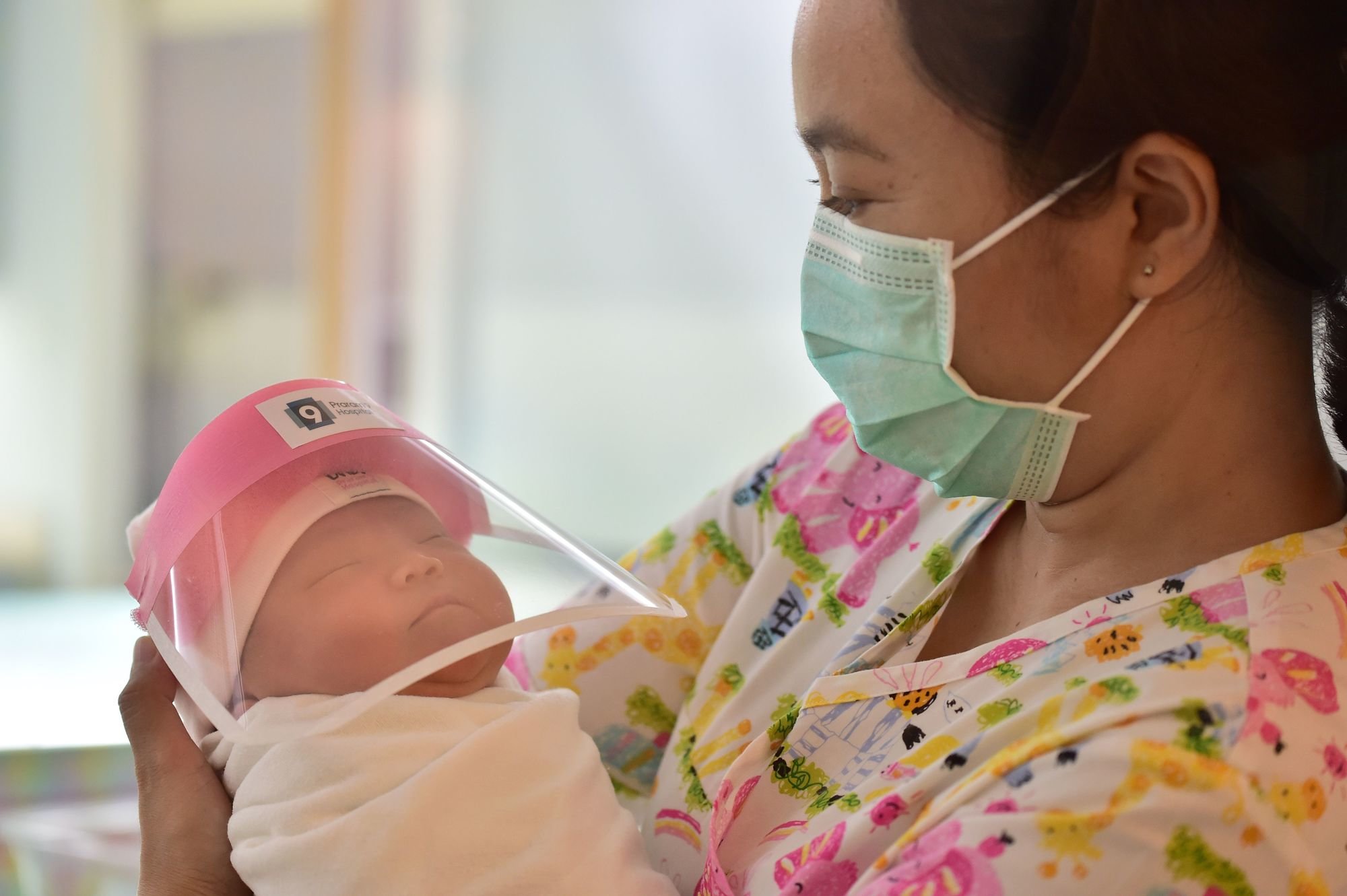
Behind every one of those numbers is a family and a story; and yet, those numbers sadly pale in comparison to the staggering losses faced by countries such as Italy, Spain, and the US.
In the US, the death doll has climbed to more than 16,000, as the White House has indicated that we are nearing the apex of the virus. Hospitals are stretched thin, particularly in high-impact areas such as New York City, where hospital beds are running low and morgues are overflowing.
Even though infants and children remain at a lower risk of dying from the illness, experts warn this doesn't mean they are immune.
"So far, it appears that more than 80 percent of the infections are pretty mild, no more severe than the common cold," Cody Meissner, professor of pediatrics at Tufts University School of Medicine and an infectious-disease expert, told NPR last month. "And children appear to have even milder infections than adults."
But these mild infections, which may often go untreated, could be contributing to what experts call a silent spread — meaning children could be unwittingly infecting their parents, grandparents, or caregivers, merely because they aren't exhibiting typical symptoms of COVID-19.
"There are three possibilities," Bruce Aylward, an epidemiologist with the World Health Organization, told Vox last month. "Kids don’t get infected for some reason; they get infected but have a low expression of disease; they get infected and express disease like everyone else but we haven’t seen it because of schools being closed. I think the first and last aren’t the reality. So it’s that middle group.
"We’ve got to get an antibody test [to test the population for antibodies to the virus] to know if kids are driving the epidemic and we just can’t see it," Aylward concluded.
As the weeks have passed, many severe pediatric cases have emerged -- some of which have been fatal.
On Monday, Louisiana Coroner Beau Clark announced the death of a newborn after its infected mother was forced into labor prematurely.
"Had she not been COVID-19 positive, had not required [ventilator] support, had not had the shortness of breath … likely she would not have gone into preterm labor and there would have been a different outcome," Clark explained, adding that oxygen deficiency played a crucial in the infant's death.
Last month, Illinois Department of Health Director Dr. Ngozi Ezike announced the first known death of a COVID-positive infant in the United States.
“Today is a really hard day," Ezike said March 28. "I’m reporting 465 new cases and 13 additional deaths, including the tragic death of an infant."
Days later, a 7-week-old baby in Connecticut became the second US child to die from the coronavirus.
"This is absolutely heartbreaking," Connecticut Gov. Ned Lamont tweeted April 1. "We believe this is one of the youngest lives lost anywhere due to complications relating to COVID-19."
Thailand's relatively low outbreak numbers may be due in large part to the strict containment measures the government put in place.
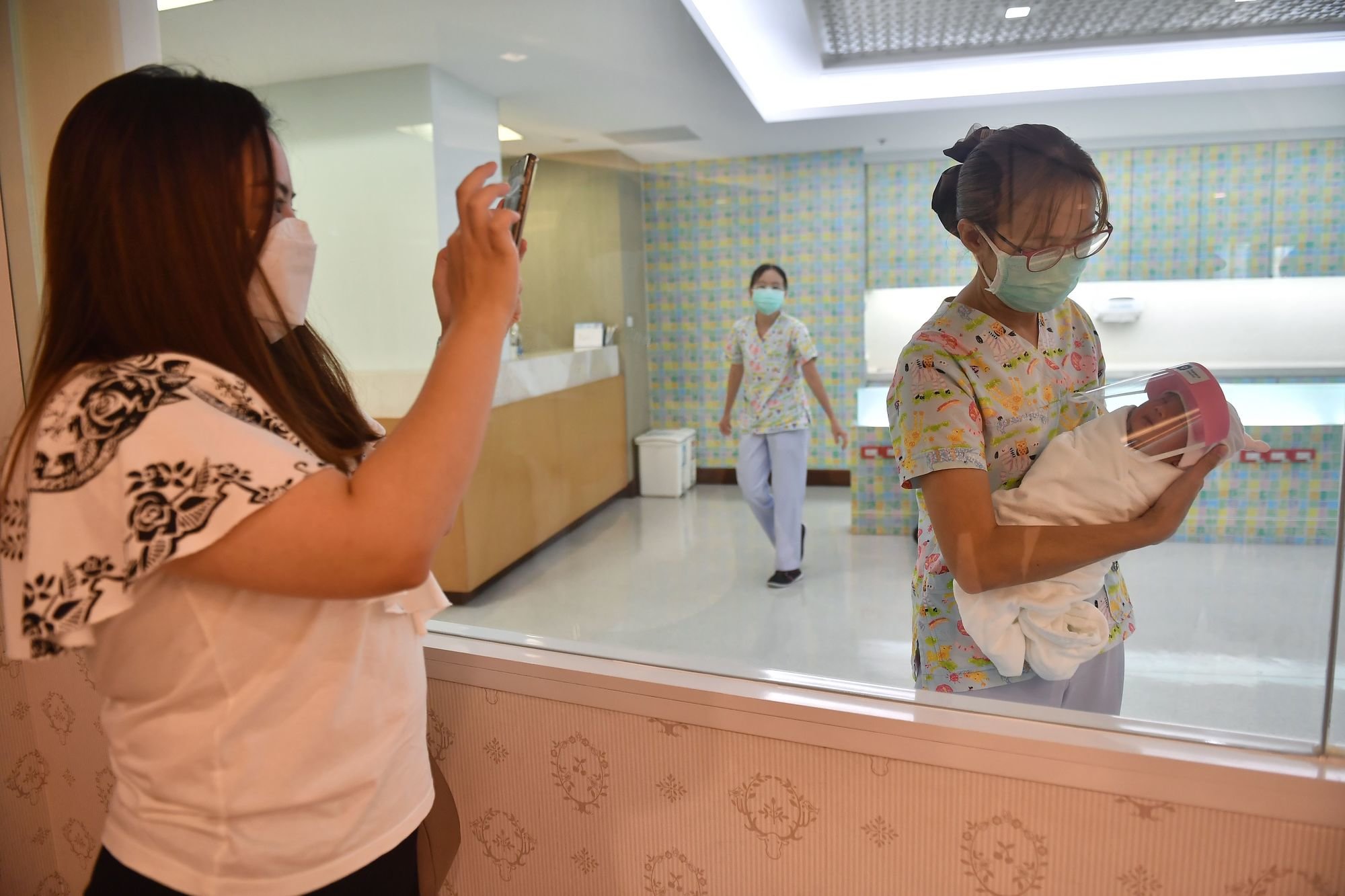
In late March, Thailand declared a one-month state of emergency, during which the government was given the power to implement curfews, censor the media, disperse gatherings, and deploy the military for enforcement, ABC News reported.
Still, Thailand Deputy Prime Minister Anutin Charnvirakul thinks that more could be done to stop the spread.
"So far Thai people have been giving full cooperation but we need more because there was a study showing that we need to have at least 80% of social distancing from our people in order to pull the curve down," Charnvirakul said, according to CNBC.
Additionally, Prime Minister Prayuth Chan-ocha told his Cabinet recently that both screening and quarantine measures will be applied to those who do travel, ABC News reported. The government is also preparing isolation centers, field hospitals, and additional medical supplies needed to combat the virus.


